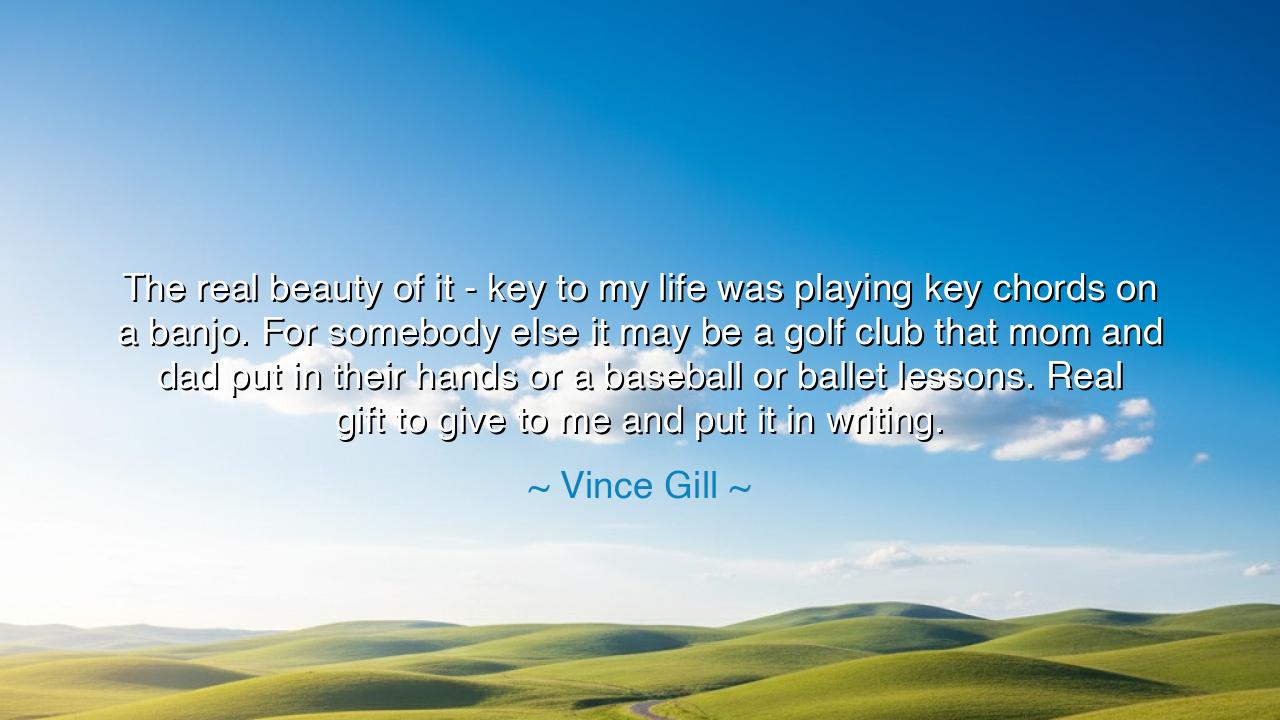
The real beauty of it - key to my life was playing key chords on
The real beauty of it - key to my life was playing key chords on a banjo. For somebody else it may be a golf club that mom and dad put in their hands or a baseball or ballet lessons. Real gift to give to me and put it in writing.






“The real beauty of it – key to my life was playing key chords on a banjo. For somebody else it may be a golf club that mom and dad put in their hands or a baseball or ballet lessons. Real gift to give to me and put it in writing.” Thus spoke Vince Gill, the musician whose melodies carry the tenderness of a life shaped by humble beginnings and sacred gifts. Beneath his words lies a truth as old as time — that the greatest treasures we receive are not wealth or fame, but the instruments of purpose placed in our hands when we are young. Whether it be a banjo, a brush, a book, or a ball, the object itself is not the miracle; the miracle is that through it, we discover who we are meant to become.
When Gill speaks of the banjo, he speaks not merely of music, but of calling — that mysterious force which awakens within us a sense of meaning. The “key chords,” he says, became the “key to his life.” Such words reveal that sometimes destiny hides in simplicity. What began as strings and wood became the pathway to expression, identity, and joy. It was through the banjo that he first touched the eternal — for art, when born from love, becomes a dialogue between the soul and the divine. The ancients believed that the gods gave each person a gift — a seed of talent or passion — and that life’s sacred duty was to discover it, nurture it, and offer its fruit back to the world.
Gill’s reflection widens beyond himself: “For somebody else it may be a golf club, or a baseball, or ballet lessons.” In this, he reveals a universal law — that the form of the gift matters not, only the devotion it awakens. For the boy who learns to swing a bat, the girl who learns to dance, or the writer who first holds a pen, each gesture becomes an act of discovery. The gift is not in the object, but in what it unlocks: discipline, imagination, courage, and the quiet joy of creation. What Gill calls the “real gift” is not the banjo itself, but the opportunity to find one’s rhythm in the great song of life.
Consider, then, the story of Ludwig van Beethoven, who, though deafened by fate, continued to compose music that moved the heavens. The piano placed in his hands as a child became not merely an instrument but a bridge between mortal suffering and immortal beauty. In the same way, the banjo was for Vince Gill what the piano was for Beethoven — a vessel for the soul’s deepest voice. Through their art, both men discovered a truth that echoes across ages: that to express one’s gift is to fulfill one’s purpose, to turn the materials of this world into something divine and enduring.
But Gill also speaks with gratitude — a remembrance that his parents were the ones who placed the gift in his hands. “A golf club that mom and dad put in their hands,” he says, acknowledging that behind every artist, athlete, or dreamer stands someone who believed before the dream could take form. The wisdom of the elders lies in their ability to see a spark in the young and to feed it with patience and faith. The ancients taught that to give a child their gift is to give them their destiny. A parent’s guidance, like a musician’s chord, resonates long after the hand that struck it is gone.
Yet, there is something even deeper in Gill’s words — a call to gratitude and self-awareness. He says, “Real gift to give to me and put it in writing.” He recognizes that to name one’s gift, to acknowledge its source, is itself a sacred act. Many go through life blind to the tools they have been given, yearning for greatness while neglecting the humble beginnings that could have led them there. Gill reminds us that beauty does not descend upon us by accident — it must be seen, cherished, and worked into being. His music, then, becomes a hymn of thanksgiving, a way of saying, I was given this gift, and I used it well.
So, my child, take this teaching to heart: find the instrument of your becoming. Whether it be a tool, a craft, or a calling, hold it with reverence. Practice not for applause, but for truth. Give thanks to those who handed you the first key — a parent, a teacher, or fate itself — and honor them by creating something worthy of the gift. For as Vince Gill reminds us, the “real beauty” of life lies not in luck or circumstance, but in the transformation of a simple gift into a lifelong harmony. Whatever your banjo may be, play its chords with heart — and through your song, you will discover the meaning of your life, shining clear and everlasting as music beneath the stars.






AAdministratorAdministrator
Welcome, honored guests. Please leave a comment, we will respond soon